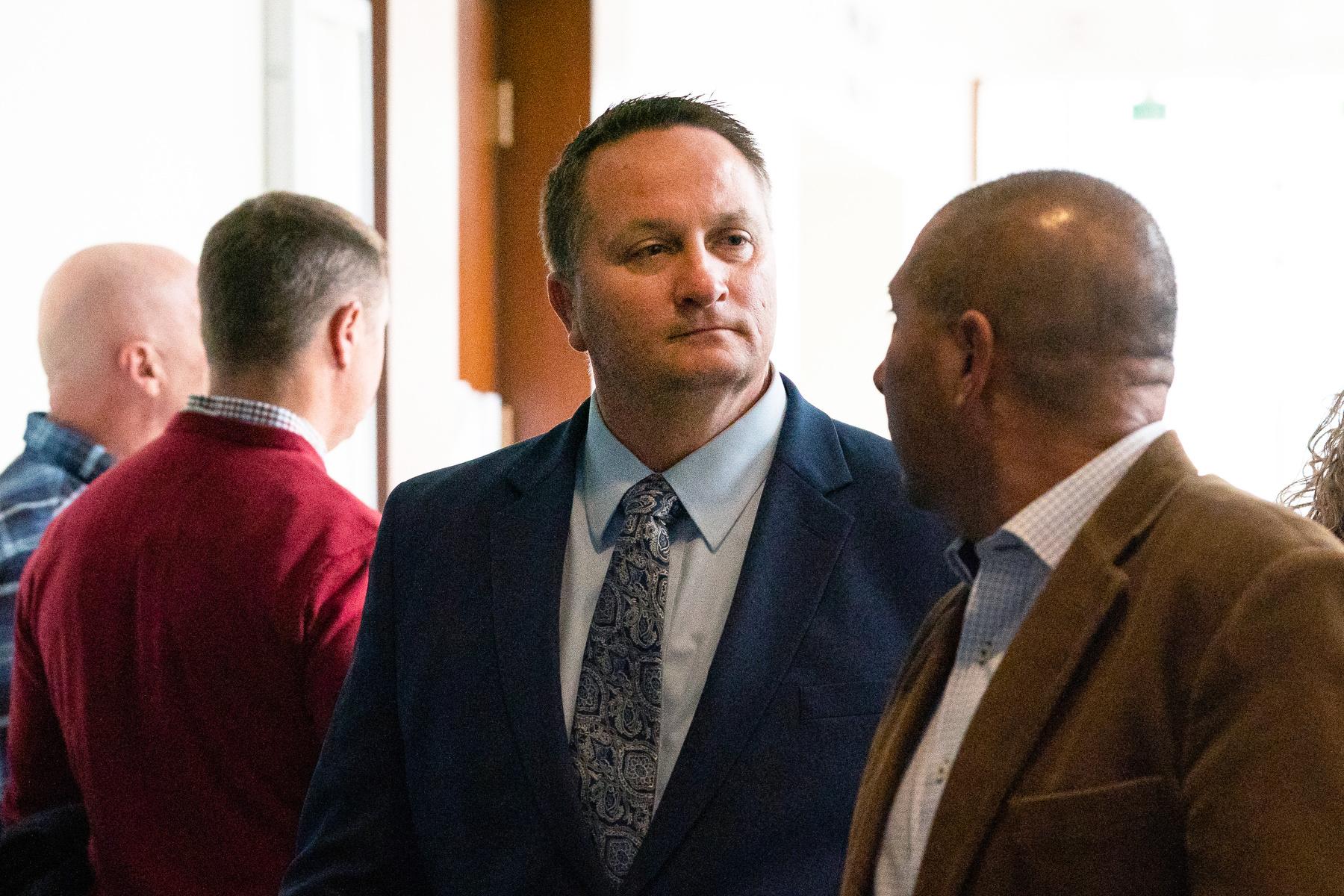
State prosecutors charging two paramedics for giving a 23-year-old massage therapist a fatal dose of ketamine after a police encounter rested their case on Wednesday with a final expert witness who said the only reason why the man died was because of their actions.
Elijah McClain died in August 2019 after a violent altercation with three law enforcement officers who brought him to the ground and gave him two carotid holds. Aurora Fire Rescue Paramedics called to the scene, Peter Cichuniec and Jeremy Cooper, then administered a large dose of ketamine and McClain’s pulse stopped in the ambulance. He never regained consciousness and he was declared brain dead a few days later.
Defense attorneys representing Cichuniec and Cooper, both of whom are charged with a number of felonies including reckless manslaughter and assault, are not expected to call any witnesses for the Adams County jury, and closing arguments are expected as early as Thursday.
Throughout several weeks of witness testimony, prosecutors sought to drill down on Cichuniec and Cooper’s alleged negligence on the scene, willfully ignoring their own training about how to care and assess patients in distress and how to responsibly administer sedatives.
Several witnesses, including one EMT on the scene that night, said under oath that Cichuniec and Cooper didn’t follow their training in evaluating McClain’s condition before administering ketamine, a sedative that can cause the respiratory system to slow down. Experts say they should have checked his vital signs and should have talked to him and checked for coherence.
Experts also said Cichuniec and Cooper didn’t follow due diligence in estimating McClain’s body size and that they didn’t medically intervene when they were witnessing McClain’s medical condition worsening in the custody of law enforcement — to the point of cardiac arrest.
One Aurora Police Department sergeant, Dale Leonard, told the jury that he didn’t understand why the paramedics weren’t more proactive on the scene with McClain lying there, handcuffed, in the grass.
Leonard was shown in officers’ body-worn camera footage directing his subordinate officers to make sure McClain “could breathe.”
“Who was in charge?” Leonard was asked by an assistant attorney general.
“Fire,” Leonard replied
“Speaking of the fire department, at any given time on this evening, do you remember any individuals from fire asking questions of Mr. McClain directly?” Leonard was asked.
“No.”
“Did you prevent them from asking questions?” Leonard was asked.
“I did not,” he said.
Defense attorneys, though, sought to cast blame on the police officers who failed to pass along vital information about McClain’s medical condition to the medics when they arrived on the scene.
Those attorneys, through cross-examination, established that neither Cichuniec nor Cooper knew that McClain had been given two carotid holds, nor did they know or understand that McClain had been complaining throughout the struggle with police that he couldn’t breathe.
McClain had vomited into a face mask a few times before officers removed it, and experts say he likely inhaled some of that fluid into his lungs before the paramedics arrived. Police officers failed to tell the paramedics this detail, too.
Defense attorneys also said a number of times that the paramedics weren’t the ones who beat up McClain on the scene, that the officers did that, and that McClain would not have died if simply given the ketamine on its own.
They also cast doubt that the paramedics were ever really in charge of the scene, which had, at one time, more than a dozen people there, including medics from Falck Rocky Mountain, an ambulance service, and several Aurora Police Department officers and supervisors.
When Cooper and Cichuniec arrived, McClain was already handcuffed.
“They don’t carry tasers, or have the keys to handcuffs,” said Cooper’s defense attorney Shana Beggan. “Police have those things.”
In rare footage of internal affairs investigation tapes played for the jury, Cichuniec and Cooper told an Aurora Police supervisor just two weeks after McClain’s death that McClain was exhibiting signs of “excited delirium” on the scene and that they followed the protocols for that diagnosis, including ordering up ketamine.
The two paramedics said that McClain had been fighting them and was exhibiting “crazy” strength and that they witnessed McClain resisting arrest and fighting with officers.
At one point, Cooper alluded to McClain walking away from the scene after being detained.
“He was still actively fighting any time that the patient would try to be placed kind of on his side, he would try to walk up the little grassy embankment, try to fight with the officers,” Cooper said in his internal affairs investigation interview. “So he was quickly put onto his side, administered the medication while they were holding the patient there.”
Body-worn camera footage shown at length in this and other trials doesn’t show that.
McClain can be seen lying mostly prone, or on his side, handcuffed on the grass. He never got up to walk away, according to expert witnesses and the body-worn camera footage, and he was not actively fighting with anyone once the paramedics arrived on the scene.
In fact, McClain was mostly catatonic by the time the ketamine was administered to his deltoid. He was not answering questions from officers or the medics who tried to speak to him.
The term “excited delirium” has been largely debunked as junk science since 2020 by several professional medical groups. Law enforcement officers in Colorado are no longer allowed to train on the diagnosis and Aurora Fire Rescue has struck the term from its manuals and training documents.
Dr. Roger Mitchell, a forensic pathologist and national expert on excited delirium, said McClain wasn’t exhibiting any signs of the diagnosis — even before paramedics arrived.
Defense attorneys have sought to justify the paramedics’ decision to give McClain 500 milligrams of ketamine by saying that police told them that he was exhibiting “crazy” strength. Because of that information, paramedics said they followed protocols associated with excited delirium, which, at the time, allowed ketamine as an antidote.
The 500 milligrams of ketamine was given after they estimated McClain’s body weight to be around 200 pounds when really he was about 145 pounds.
But, in body-worn camera footage shown in court on Wednesday, Mitchell said McClain was not exhibiting any signs of excited delirium, even right in the first few seconds of his interaction with police, as they took him to the ground.
“Did you see any signs of excited delirium in that video?” prosecutors asked.
“No,” Mitchell said.
He also testified that, given the evidence he had reviewed on behalf of the prosecution, which included McClain’s medical records, his autopsy, the body-worn camera footage, and the police reports, he likely died because of the ketamine.
The forensic pathologist who conducted McClain’s autopsy for Adams County said McClain died from “complications of ketamine following forcible police restraint.”
Mitchell told the jury on Wednesday that there was no medical reason to give McClain ketamine that night, that when paramedics arrived on the scene, McClain was already almost unconscious, “in bad shape,” Mitchell said.
“Is ketamine administered in the way it was administered here capable of causing serious bodily injury?” asked state Solicitor General Shannon Stevenson.
“Yes,” Mitchell replied.
“Is it capable of causing death?” she asked.
“Yes,” Mitchell said.
“Did it have any medical purpose for Mr. McClain in the situation?” she asked.
“No,” Mitchell said.
Stevenson continued, “Do you have an opinion about whether the actions of the Aurora fire personnel at that scene caused Elijah McClain’s death?”
“Yes,” Mitchell said. “The ketamine administration was listed in my cause of death as a cause. And so those that administered that ketamine are responsible for the death.”
- Aurora police officer acquitted in Elijah McClain’s death to get more than $200,000 in back pay
- Colorado strikes “excited delirium” from all law enforcement diagnosis, training documents
- Elijah McClain’s mother feels like justice has not been served
- Paramedics on Aurora Police investigation tapes say Elijah McClain had ‘excited delirium’









